Deck 6: Reactions of Alkenes
Question
Question
Question
Question
Question
Question
Question
Question
Question
Question
Question
Question
Question
Question
Question
Question
Question
Question
Question
Question
Question
Question
Question
Question
Question
Question
Question
Question
Question
Question
Question
Question
Question
Question
Question
Question
Question
Question
Question
Question
Question
Question
Question
Question
Question
Question
Question
Question
Question
Question
Question
Question
Question
Question
Question
Question
Question
Question
Question
Question
Question
Question
Question
Question
Question
Question
Question
Question
Question
Question
Question
Question
Question
Question
Question
Question
Question
Question
Question
Question

Unlock Deck
Sign up to unlock the cards in this deck!
Unlock Deck
Unlock Deck
1/93
Play
Full screen (f)
Deck 6: Reactions of Alkenes
1
Which statement(s)are true according to the Hammond postulate?
A)In an exergonic reaction, the transition state is more similar in energy to the reactant than the product.
B)In an exergonic reaction, the transition state is more similar in energy to the product than the reactant.
C)In an endergonic reaction, the transition state is more similar in energy to the reactant than the product.
D)In an endergonic reaction, the transition state is more similar in energy to the product than the reactant.
E)A and D
A)In an exergonic reaction, the transition state is more similar in energy to the reactant than the product.
B)In an exergonic reaction, the transition state is more similar in energy to the product than the reactant.
C)In an endergonic reaction, the transition state is more similar in energy to the reactant than the product.
D)In an endergonic reaction, the transition state is more similar in energy to the product than the reactant.
E)A and D
A and D
2
Draw the major organic product generated in the reaction below. 


3
Which of the following alkenes reacts with HCl at the slowest rate?
A)
B)
C)
D)
E)
A)

B)

C)

D)

E)


4
Draw the major organic product generated in the reaction below. 


Unlock Deck
Unlock for access to all 93 flashcards in this deck.
Unlock Deck
k this deck
5
Complete the following reaction and provide a detailed, step-by-step mechanism for the process. 


Unlock Deck
Unlock for access to all 93 flashcards in this deck.
Unlock Deck
k this deck
6
Identify the most stable carbocation.
A)
B)
C)
D)
E)
A)

B)

C)

D)

E)


Unlock Deck
Unlock for access to all 93 flashcards in this deck.
Unlock Deck
k this deck
7
What is hyperconjugation, and how does it affect carbocation stability?

Unlock Deck
Unlock for access to all 93 flashcards in this deck.
Unlock Deck
k this deck
8
Which of the following is the most stable carbocation? 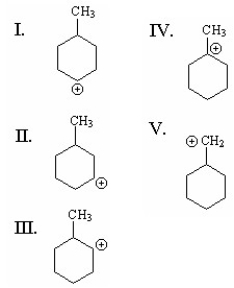
A)I
B)II
C)III
D)IV
E)V

A)I
B)II
C)III
D)IV
E)V

Unlock Deck
Unlock for access to all 93 flashcards in this deck.
Unlock Deck
k this deck
9
Provide the structure of the major organic product in the reaction below. 


Unlock Deck
Unlock for access to all 93 flashcards in this deck.
Unlock Deck
k this deck
10
For an endergonic reaction step, the Hammond postulate allows one to say that ________.
A)the transition state of the step resembles the reactants of the step
B)the transition state of the step resembles the products of the step
C)the step is rate-determining since it has the smallest Ea
D)the reaction containing this step is overall first order
E)the transition state is precisely symmetric with bond-breaking and bond-forming occurring to the same extent
A)the transition state of the step resembles the reactants of the step
B)the transition state of the step resembles the products of the step
C)the step is rate-determining since it has the smallest Ea
D)the reaction containing this step is overall first order
E)the transition state is precisely symmetric with bond-breaking and bond-forming occurring to the same extent

Unlock Deck
Unlock for access to all 93 flashcards in this deck.
Unlock Deck
k this deck
11
Provide the structure of the major organic product in the reaction below. 


Unlock Deck
Unlock for access to all 93 flashcards in this deck.
Unlock Deck
k this deck
12
Which of the following compounds will react most rapidly with HCl?
A)5-methyl-1-hexene
B)4-methyl-1-hexene
C)(E)-5-methyl-2-hexene
D)(E)-2-methyl-3-hexene
E)2-methyl-2-hexene
A)5-methyl-1-hexene
B)4-methyl-1-hexene
C)(E)-5-methyl-2-hexene
D)(E)-2-methyl-3-hexene
E)2-methyl-2-hexene

Unlock Deck
Unlock for access to all 93 flashcards in this deck.
Unlock Deck
k this deck
13
Draw the major organic product generated in the reaction below. 


Unlock Deck
Unlock for access to all 93 flashcards in this deck.
Unlock Deck
k this deck
14
Draw the product. 


Unlock Deck
Unlock for access to all 93 flashcards in this deck.
Unlock Deck
k this deck
15
Draw the major organic product generated in the reaction below. 


Unlock Deck
Unlock for access to all 93 flashcards in this deck.
Unlock Deck
k this deck
16
Draw the major organic product generated in the reaction below. 


Unlock Deck
Unlock for access to all 93 flashcards in this deck.
Unlock Deck
k this deck
17
Draw the major organic product generated in the reaction below. 


Unlock Deck
Unlock for access to all 93 flashcards in this deck.
Unlock Deck
k this deck
18
According to the Hammond Postulate, which of the following is correct?
A)The transition state of an endothermic reaction step will be more reactant-like than product-like.
B)The intermediate of an endothermic reaction step will be more reactant-like than product-like.
C)The transition state of an exothermic reaction step will be more reactant-like than product-like.
D)All transition states are more product-like than reactant-like.
E)All transition states are more reactant-like than product-like.
A)The transition state of an endothermic reaction step will be more reactant-like than product-like.
B)The intermediate of an endothermic reaction step will be more reactant-like than product-like.
C)The transition state of an exothermic reaction step will be more reactant-like than product-like.
D)All transition states are more product-like than reactant-like.
E)All transition states are more reactant-like than product-like.

Unlock Deck
Unlock for access to all 93 flashcards in this deck.
Unlock Deck
k this deck
19
Which alkene reacts the fastest with HBr?
A)
B)
C)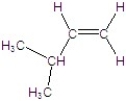
D)
E)
A)

B)

C)

D)

E)


Unlock Deck
Unlock for access to all 93 flashcards in this deck.
Unlock Deck
k this deck
20
Based on the relative stabilities of the intermediates involved, explain the basis for Markovnikov's rule in the addition of hydrogen halides to alkenes.

Unlock Deck
Unlock for access to all 93 flashcards in this deck.
Unlock Deck
k this deck
21
Identify the true statements in the mechanism in the addition of water to an alkene.
A)The addition of the electrophile is a slow step.
B)The addition of the nucleophile is a fast step.
C)A carbocation is formed as an intermediate.
D)Water abstracts the extra proton from the protonated alcohol.
E)All of the above
A)The addition of the electrophile is a slow step.
B)The addition of the nucleophile is a fast step.
C)A carbocation is formed as an intermediate.
D)Water abstracts the extra proton from the protonated alcohol.
E)All of the above

Unlock Deck
Unlock for access to all 93 flashcards in this deck.
Unlock Deck
k this deck
22
Provide the major organic product(s)in the reaction below. 


Unlock Deck
Unlock for access to all 93 flashcards in this deck.
Unlock Deck
k this deck
23
Provide the structure of the major organic product in the reaction below. 


Unlock Deck
Unlock for access to all 93 flashcards in this deck.
Unlock Deck
k this deck
24
Provide the structure of the major organic product of the following reaction. 


Unlock Deck
Unlock for access to all 93 flashcards in this deck.
Unlock Deck
k this deck
25
Give the product for the reaction of 1-butene with methanol in the presence of acid.
A)1-ethoxybutane
B)2-ethoxybutane
C)1-methoxybutane
D)2-methoxybutane
E)1-butanol
A)1-ethoxybutane
B)2-ethoxybutane
C)1-methoxybutane
D)2-methoxybutane
E)1-butanol

Unlock Deck
Unlock for access to all 93 flashcards in this deck.
Unlock Deck
k this deck
26
Draw the product. 


Unlock Deck
Unlock for access to all 93 flashcards in this deck.
Unlock Deck
k this deck
27
Which is more highly regioselective the addition of HCl to methylenecyclohexane or to 1-methylcyclohexene? Explain.

Unlock Deck
Unlock for access to all 93 flashcards in this deck.
Unlock Deck
k this deck
28
Provide the structure of the major organic product of the following reaction. 


Unlock Deck
Unlock for access to all 93 flashcards in this deck.
Unlock Deck
k this deck
29
Draw the product. 


Unlock Deck
Unlock for access to all 93 flashcards in this deck.
Unlock Deck
k this deck
30
Draw the major organic product generated in the reaction below. 


Unlock Deck
Unlock for access to all 93 flashcards in this deck.
Unlock Deck
k this deck
31
Provide the major organic product(s)in the reaction below. 


Unlock Deck
Unlock for access to all 93 flashcards in this deck.
Unlock Deck
k this deck
32
Which of the following alkenes yield(s)3-bromo-3-methylpentane as the major product upon addition of HBr? 
A)I and II only
B)III only
C)I, II, nad III only
D)all of them
E)none of them

A)I and II only
B)III only
C)I, II, nad III only
D)all of them
E)none of them

Unlock Deck
Unlock for access to all 93 flashcards in this deck.
Unlock Deck
k this deck
33
Draw the major organic product generated in the reaction below. 


Unlock Deck
Unlock for access to all 93 flashcards in this deck.
Unlock Deck
k this deck
34
Draw the major organic product generated in the reaction below. 


Unlock Deck
Unlock for access to all 93 flashcards in this deck.
Unlock Deck
k this deck
35
Complete the following reaction and provide a detailed, step-by-step mechanism for the process. 


Unlock Deck
Unlock for access to all 93 flashcards in this deck.
Unlock Deck
k this deck
36
Provide the structure of the major organic product in the reaction below. 


Unlock Deck
Unlock for access to all 93 flashcards in this deck.
Unlock Deck
k this deck
37
What is the major product of the following reaction? 
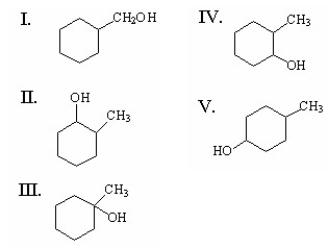
A)I
B)II
C)III
D)IV
E)V


A)I
B)II
C)III
D)IV
E)V

Unlock Deck
Unlock for access to all 93 flashcards in this deck.
Unlock Deck
k this deck
38
What is the major product from the acid-catalyzed hydration of 2-methyl-2-pentene?
A)2-methylpentane
B)2-methyl-1-pentanol
C)2-methyl-2-pentanol
D)2-methyl-3-pentanol
E)1-methoxypentane
A)2-methylpentane
B)2-methyl-1-pentanol
C)2-methyl-2-pentanol
D)2-methyl-3-pentanol
E)1-methoxypentane

Unlock Deck
Unlock for access to all 93 flashcards in this deck.
Unlock Deck
k this deck
39
Draw the structures of the two alkenes that react with HBr to yield 1-bromo-1-methylcyclopentane as the major organic product.

Unlock Deck
Unlock for access to all 93 flashcards in this deck.
Unlock Deck
k this deck
40
Propose a mechanism for the following reaction: 


Unlock Deck
Unlock for access to all 93 flashcards in this deck.
Unlock Deck
k this deck
41
Give the major organic product of the reaction shown. 
A)
B)
C)
D)
E)

A)

B)

C)

D)

E)


Unlock Deck
Unlock for access to all 93 flashcards in this deck.
Unlock Deck
k this deck
42
Provide the major organic product(s)in the reaction below. 


Unlock Deck
Unlock for access to all 93 flashcards in this deck.
Unlock Deck
k this deck
43
Which of the following is the best reaction sequence to use if one wants to accomplish a Markovnikov addition of water to an alkene with minimal skeletal rearrangement?
A)water + dilute acid
B)water + concentrated acid
C)oxymercuration-demercuration
D)hydroboration-oxidation
E)none of the above
A)water + dilute acid
B)water + concentrated acid
C)oxymercuration-demercuration
D)hydroboration-oxidation
E)none of the above

Unlock Deck
Unlock for access to all 93 flashcards in this deck.
Unlock Deck
k this deck
44
Provide the structure of the major organic product of the following reaction. 


Unlock Deck
Unlock for access to all 93 flashcards in this deck.
Unlock Deck
k this deck
45
Provide the structure of the major organic product in the reaction below. 


Unlock Deck
Unlock for access to all 93 flashcards in this deck.
Unlock Deck
k this deck
46
Draw the major organic product generated in the reaction below. 


Unlock Deck
Unlock for access to all 93 flashcards in this deck.
Unlock Deck
k this deck
47
Give the best product for the following reaction. 
A)
B)
C)
D)
E)

A)

B)

C)

D)

E)


Unlock Deck
Unlock for access to all 93 flashcards in this deck.
Unlock Deck
k this deck
48
Which statement is true in the oxymercuration-reduction of an alkene?
A)Markovnikov orientation and syn addition occur.
B)Markovnikov orientation and anti addition occur.
C)Anti-Markovnikov orientation and syn addition occur.
D)Anti-Markovnikov orientation and anti addition occur.
E)Markonikov orientation and both syn and anti addition occur.
A)Markovnikov orientation and syn addition occur.
B)Markovnikov orientation and anti addition occur.
C)Anti-Markovnikov orientation and syn addition occur.
D)Anti-Markovnikov orientation and anti addition occur.
E)Markonikov orientation and both syn and anti addition occur.

Unlock Deck
Unlock for access to all 93 flashcards in this deck.
Unlock Deck
k this deck
49
What reagents are needed to accomplish the following transformation? 
A)H2O/H+
B)H2O/Peroxide
C)OH-
D)BH3
E)1) BH3/ 2. HO-, H2O2, H2O

A)H2O/H+
B)H2O/Peroxide
C)OH-
D)BH3
E)1) BH3/ 2. HO-, H2O2, H2O

Unlock Deck
Unlock for access to all 93 flashcards in this deck.
Unlock Deck
k this deck
50
Provide the major organic product(s)in the reaction below. 


Unlock Deck
Unlock for access to all 93 flashcards in this deck.
Unlock Deck
k this deck
51
Draw the product. 


Unlock Deck
Unlock for access to all 93 flashcards in this deck.
Unlock Deck
k this deck
52
Which of the following carbocations is likely to rearrange? 
A)I
B)II
C)III
D)IV
E)II and IV

A)I
B)II
C)III
D)IV
E)II and IV

Unlock Deck
Unlock for access to all 93 flashcards in this deck.
Unlock Deck
k this deck
53
What is the name of the major organic product of the following reaction? 
A)3,3-dimethyl-1-butanol
B)3,3-dimethyl-2-butanol
C)2,3-dimethyl-2-butanol
D)2,3-dimethyl-1-butanol
E)4-methyl-2-pentanol

A)3,3-dimethyl-1-butanol
B)3,3-dimethyl-2-butanol
C)2,3-dimethyl-2-butanol
D)2,3-dimethyl-1-butanol
E)4-methyl-2-pentanol

Unlock Deck
Unlock for access to all 93 flashcards in this deck.
Unlock Deck
k this deck
54
Provide the major organic product in the reaction below. 
A)
B)
C)
D)
E)

A)

B)

C)

D)

E)


Unlock Deck
Unlock for access to all 93 flashcards in this deck.
Unlock Deck
k this deck
55
Provide the structure of the major organic product in the reaction below. 


Unlock Deck
Unlock for access to all 93 flashcards in this deck.
Unlock Deck
k this deck
56
What reagents can best be used to accomplish the following transformation? 
A)1) BH3∙THF 2. HO-, H2O2
B)H+, H2O
C)1) Hg(OAc)2, H2O/THF 2. NaBH4
D)1) Hg(O2CCF3)2, CH3OH 2. NaBH4
E)NaOH, H2O

A)1) BH3∙THF 2. HO-, H2O2
B)H+, H2O
C)1) Hg(OAc)2, H2O/THF 2. NaBH4
D)1) Hg(O2CCF3)2, CH3OH 2. NaBH4
E)NaOH, H2O

Unlock Deck
Unlock for access to all 93 flashcards in this deck.
Unlock Deck
k this deck
57
Draw the major organic product generated in the reaction below. 


Unlock Deck
Unlock for access to all 93 flashcards in this deck.
Unlock Deck
k this deck
58
Which statement is true in the hydroboration-oxidation of an alkene?
A)Markovnikov orientation and syn addition occur.
B)Markovnikov orientation and anti addition occur.
C)Anti-Markovnikov orientation and syn addition occur.
D)Anti-Markovnikov orientation and anti addition occur.
E)Markovnikov orientation and both syn and anti addition occur.
A)Markovnikov orientation and syn addition occur.
B)Markovnikov orientation and anti addition occur.
C)Anti-Markovnikov orientation and syn addition occur.
D)Anti-Markovnikov orientation and anti addition occur.
E)Markovnikov orientation and both syn and anti addition occur.

Unlock Deck
Unlock for access to all 93 flashcards in this deck.
Unlock Deck
k this deck
59
Provide the major organic product(s)in the reaction below. 


Unlock Deck
Unlock for access to all 93 flashcards in this deck.
Unlock Deck
k this deck
60
Provide the structure of the major organic product of the following reaction. 


Unlock Deck
Unlock for access to all 93 flashcards in this deck.
Unlock Deck
k this deck
61
Draw the product. 


Unlock Deck
Unlock for access to all 93 flashcards in this deck.
Unlock Deck
k this deck
62
Provide the major organic product(s)in the reaction below. 


Unlock Deck
Unlock for access to all 93 flashcards in this deck.
Unlock Deck
k this deck
63
Provide a detailed, step-by-step mechanism for the reaction shown below. 


Unlock Deck
Unlock for access to all 93 flashcards in this deck.
Unlock Deck
k this deck
64
Give the intermediate for the halohydrin reaction.
A)a halonium ion
B)the most stable carbocation with OH on the adjacent carbon
C)the most stable carbocation with X on the adjacent carbon
D)a cyclic oxonium ion
E)the most stable carbanion
A)a halonium ion
B)the most stable carbocation with OH on the adjacent carbon
C)the most stable carbocation with X on the adjacent carbon
D)a cyclic oxonium ion
E)the most stable carbanion

Unlock Deck
Unlock for access to all 93 flashcards in this deck.
Unlock Deck
k this deck
65
Provide the structure of the major organic product in the reaction below. 


Unlock Deck
Unlock for access to all 93 flashcards in this deck.
Unlock Deck
k this deck
66
Draw the major organic product generated in the reaction below. 


Unlock Deck
Unlock for access to all 93 flashcards in this deck.
Unlock Deck
k this deck
67
Draw the structure of the major product of the reaction below. 


Unlock Deck
Unlock for access to all 93 flashcards in this deck.
Unlock Deck
k this deck
68
Which reaction intermediate is formed when Br2/CCl4 reacts with cyclohexene? 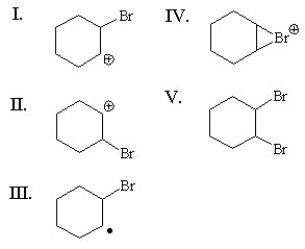
A)I
B)II
C)III
D)IV
E)V

A)I
B)II
C)III
D)IV
E)V

Unlock Deck
Unlock for access to all 93 flashcards in this deck.
Unlock Deck
k this deck
69
Draw the major organic product generated in the reaction below. 


Unlock Deck
Unlock for access to all 93 flashcards in this deck.
Unlock Deck
k this deck
70
Draw the products. 


Unlock Deck
Unlock for access to all 93 flashcards in this deck.
Unlock Deck
k this deck
71
Provide the structure of the major organic product in the reaction below. 


Unlock Deck
Unlock for access to all 93 flashcards in this deck.
Unlock Deck
k this deck
72
Give the product for the reaction that occurs when 1-pentene is treated with Cl2.
A)1-chloropentane
B)2-chloropentane
C)1,1-dichloropentane
D)2,2-dichloropentane
E)1,2-dichloropentane
A)1-chloropentane
B)2-chloropentane
C)1,1-dichloropentane
D)2,2-dichloropentane
E)1,2-dichloropentane

Unlock Deck
Unlock for access to all 93 flashcards in this deck.
Unlock Deck
k this deck
73
Complete the following reaction and provide a detailed, step-by-step mechanism for the process. 


Unlock Deck
Unlock for access to all 93 flashcards in this deck.
Unlock Deck
k this deck
74
Provide the major organic product(s)in the reaction below. 


Unlock Deck
Unlock for access to all 93 flashcards in this deck.
Unlock Deck
k this deck
75
What is the major product of the following reaction? 
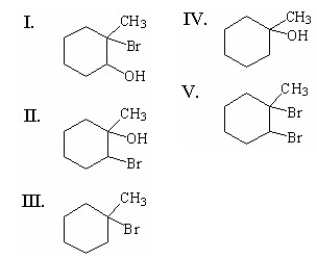
A)I
B)II
C)III
D)IV
E)V


A)I
B)II
C)III
D)IV
E)V

Unlock Deck
Unlock for access to all 93 flashcards in this deck.
Unlock Deck
k this deck
76
Draw the major organic product generated in the reaction below. 


Unlock Deck
Unlock for access to all 93 flashcards in this deck.
Unlock Deck
k this deck
77
Draw the major organic product generated in the reaction below. 


Unlock Deck
Unlock for access to all 93 flashcards in this deck.
Unlock Deck
k this deck
78
Provide the major organic product in the reaction below. 
A)
B)
C)
D)
E)

A)

B)

C)

D)

E)


Unlock Deck
Unlock for access to all 93 flashcards in this deck.
Unlock Deck
k this deck
79
Provide the structure of the major organic product in the reaction below. 


Unlock Deck
Unlock for access to all 93 flashcards in this deck.
Unlock Deck
k this deck
80
Provide the major organic product(s)in the reaction below. 


Unlock Deck
Unlock for access to all 93 flashcards in this deck.
Unlock Deck
k this deck


